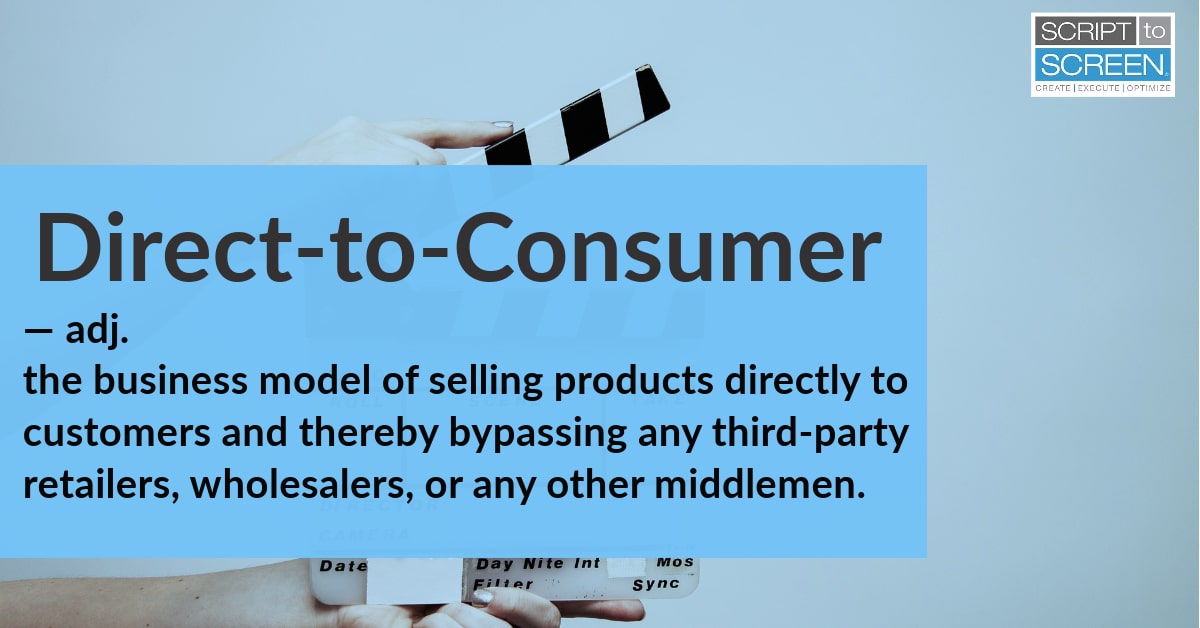
Direct-to-consumer (DTC) marketing is a strategy where companies sell products or services directly to consumers without middlemen like retailers. DTC marketing is as old as the Fuller Brush company when in the early 1900’s, makers of the Fuller brush sold their products door to door. DTC marketing has increased significantly over the last several years thanks to advancements in technology, changes in consumer behavior, and the benefits it offers.
Brands of all sizes, from startups to fortune 100 companies, embrace direct marketing to connect directly with consumers.
Here are just a few of the reasons companies choose to market direct to consumer:
- Best Sales Message every time. Direct-to-Consumer marketing allows for putting your very best sales message front and center every time. Companies control their message, no one knows their product or consumer better than the individual company and the ability to put forth the most compelling message regarding the product or service.
- Testing, Data and Insights: DTC allows companies to gather valuable data and insights directly from their marketing efforts and customers. Data includes specific channel ROI, purchase behavior, demographics, etc. Direct access to testing new strategies, pricing, messages and channels, and the ability to pivot and refine quickly is key to success in this business environment.
- Branding Control: With DTC marketing, companies have full control over how their brand is presented. This allows for consistent positioning, messaging, brand storytelling, differentiation, and the creation of a unique and personalized brand experience.
- Fostering Customer Relationships: By interacting directly with customers, companies can build stronger relationships and foster loyalty. This direct connection allows for better customer support, the ability to address customer concerns quickly, and to gather information about consumer desires for future product innovation.
- Pricing/Offer flexibility: DTC allow companies to quickly change offers, product configurations and pricing strategies. Flexibility helps companies remain competitive and relevant in the marketplace.
- No Borders: E-commerce is key to DTC success and as such, brands reach into geographic markets without the need or expense of brick-and-mortar stores. National and international growth is much easier to achieve.
DTC marketing channels
- Televison: Television advertising in the form of :30, :60, [2:00], [3:00] [5:00] and [28:30] commercial spots.
- Radio/Podcast: 30, :60, [2:00], [3:00] [5:00] and [28:30] commercial spots.
- Social Media Advertising: Facebook, Instagram, and TikTok target specific demographics with relevant content and engaging ads. User generated content and Influencer partnerships also play a role in this strategy.
- Digital – SEO, Pay Per click, shopping ads
- Direct Mail and Catalogs:Physical marketing materials like catalogs and postcards can still be effective, especially when creatively designed and targeted to specific customer segments.
- E-commerce sites: Amazon, Target, Walmart etc.
Strategies for Successful DTC Marketing
- Strong Online Presence: A well-designed, user-friendly e-commerce website is essential to Direct-to-Consumer marketing. Easy to navigate, seamless online shopping experiences and optimization for mobile devices is critical to success.
- Social Media Engagement: Platforms like Instagram, Facebook, and TikTok offer opportunities for brands to engage directly with their target audience. Creative content, influencer partnerships, user generated content and interactive posts can all enhance brand sales and visibility.
- Content Marketing: Brands can establish themselves as authorities in their industry by creating valuable and relevant content that links back to the brand but is not directly sales oriented. This content is placed on channels that consumers will stumble across, like search engines, social media, and YouTube. Blogs, videos, and how-to guides will attract customers while fostering trust and credibility.
- SEO: Optimizing your site technically for load times and search engine scans as well as making sure your content gets high rankings for the keywords your target audience uses. This allows for content marketing to target specific keyword phrases customers use to buy a product.
- Email Marketing: emailmarketing can be a low-cost and high-impact tool with the ability to increase customer engagement and drive sales. E-mail lists enable direct communication with interested customers. Brands can send tailored offers, product updates, and relevant content to maintain engagement.
- SMS/TEXT: Short Message Service, or simply texting — allows brands the opportunity to meet customers where they spend the most time. SMS is effective when it comes to sales as well as remarketing, abandoned carts, customer service inquiries and promoting new product launches.
Going Direct-to-Consumer
Direct-to-Consumer (or “D2C”), has become one of the most important forms of sales to get goods and services into the hands of the public. Direct-to-Consumer is the method of selling a product or service with virtually no middlemen between the consumer and the marketer, potentially eliminating extra markups and middlemen like retailers. While successful Direct-to-Consumer marketing has been around a long time — think a baker selling bread directly to a customer – the internet has allowed advances in communication and supply chain management to improve efficiencies and margins for marketers. Technology is transforming this process in both online and offline e-commerce platforms.
A Direct-to-Consumer business plan generally involves building a microsite if sales are through the web or brick and mortar store outlets for some brands like Verizon. Sales transactions don’t require retailers or “etailers” because the marketer appeals directly to its consumers.
90% of customers would rather purchase directly from a brand
According to Nielsen, 90% of customers would rather purchase directly from a brand than from a retailer. Your customers actually want to purchase from you, you just need to show them how they can.
Giving You Control

Build a Relationship with Your Customer
The ultimate benefit to the Direct-to-Consumer model is that your customer enters into a relationship with you instead of a relationship with your retailer. When someone purchases your product at a retailer, they’re really the customer of the retailer, not you. Their point of contact is with the store. The store is the one collecting their data, finding out what their wants and needs are, who they are as people — data that is be vital to the evolution of your company. This is especially true in this era of retail shrinkage, as fewer and fewer stores continue to dominate the economic landscape.

While retail will continue to be a part of sales for companies as some consumers habits are entrenched, retailers don’t have a particular loyalty to your company. They do not care about the health of your business, beyond that your business is creating products that they can sell. If another company is creating a product that sells better for the retailer, they are going to get your shelf space.
Determined to Be Successful
Preserving margins, having a relationship with your consumers, having a say in your cashflow…. The Direct-to-Consumer model is the future of sales and quite possibly will determine how successful your company will be.
Future of Direct-to-Consumer Marketing
Direct to Consumer marketing has certainly disrupted the traditional retail landscape. DTC marketing is ever changing, ever evolving. Artificial Intelligence may be the next big incremental pivot in DTC marketing. Marketers are eagerly looking at ways AI can positively impact their business.
DTC is not a one size fits all marketing strategy. Companies must have a deep understanding of their target market, digital marketing strategies, and the ability to adapt to the rapidly changing consumer and digital dynamics.
The companies that have harnessed the power of marketing direct to consumer enjoy unprecedented customer engagement, loyalty, brand control and business growth.

